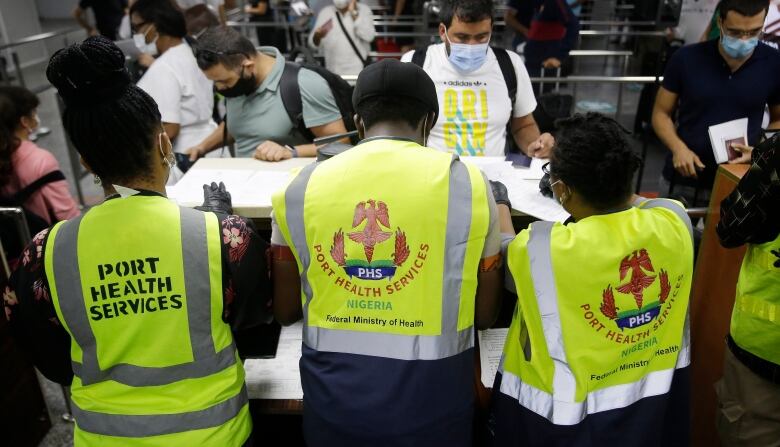Reversal of travel restrictions still costly for affected temporary residents in Alberta
Postponed funerals, last minute flights and bureaucratic limbo caused by restriction flip-flop

Canada's decision to impose and subsequently remove Omicron-related travel restrictions on 10 African countrieshas left some people in Alberta frustrated,scrambling and spending.
In late November, in response to the new COVID-19 variant of concern's surge worldwide, Canada imposed a ban on travellers from 10 African countries: Botswana,Egypt,Eswatini, Lesotho,Mozambique, Namibia, Nigeria, Malawi,South Africaand Zimbabwe.
Canadian citizens and permanent residents who had been in those countries were allowed into Canada but had to quarantine for 14 days, while temporary residents couldn't get back into the country.
Amid a backlash against blanket travel bans from the World Health Organization (WHO) and others, Canada revoked its ban on Dec. 18.
CBC Calgary spoke with some temporary residents in Alberta who are affected.
Adebola Odebode says she felt helpless when Canada announced its travel restrictions in late November. Odebode whose mother died from COVID-19 and her brother, who lives in Ontario, waited a year to finally perform funeral rites they thought they would be able to attend.
"We couldn't do it immediately [when] she passed away because of travel restrictions. This time around we thought things were getting better and we found out just a few weeks before that [the new restrictions] happened," said Odebode.
"It feels like COVID has just affected our lives so much. I lost my mom to COVID, and my family and I can't go home to give her a proper funeral because of COVID."
After cancelling her flights and postponing funeral plans in Nigeria, she says Canada's decision to reverse the travel restrictions wasdisappointing. It'sput her family in a space of uncertainty.

"It's impossible to plan because in three months' time, we don't know what will happen. If there is a more transmissible variant or more infectious variant of COVID, nobody really knows so it's difficult to plan ahead."
Trip worth the money and risk
Nomai Emina was also forced to cancel a flight to Nigeria she had booked in April. However, once restrictions were reversed, Emina rebooked and flew out Tuesday, paying $1,000 more for the chance to see her parents after three years overseas.
Emina has not seen her family since she moved to Edmonton for the chemical engineering program at the University of Alberta in 2018. As a co-op student, work experience is integrated into her degree. While she appreciates the opportunity for paid employment in her field, it also limits the time she has to travel.
"I can't leave any other time of the year because I'm a student all year round." said Emina. "I have to actually complete this to get my degree."
Outside of the financial cost, Emina is also aware of the risks of getting caught between borders.
"I kind of feel uneasy. My worst-case scenario is that I wouldn't be able to come back, especially since I'm going back to school."
After cancelling plans to visit in 2020 because of the pandemic, it is all worth it to finally see her family.
"I have to see my parents, they're only alive for so long," said Emina.
"I've taken all the precautions, I'm [double] vaccinated, when I come back I'm due for my booster shot. There's really nothing else I can do at this point."
Cooperation, vaccine equity necessary
Ugonna Ohakim booked his flight to Nigeria in August to avoid the spike in prices closer to the holiday season. Butthe Canadian government's travel restrictions and the Nigerian government's decision to consider a reciprocal ban led him to cancel his plans and stay in Calgary.
Ohakim a recent graduate on a work visa says it was easier to cancel his trip since he visited the country last year. These trips, he says, are importantfor temporary residents like international students.
"If they don't know a lot of people here or just moved into the country this year, they have to brave through Christmas on their own," he said.

Some feel they are caught between governments who are not prepared to work together to end the pandemic.
"Cooperation between governments and countries is at an all-time low.It's crazy how governments are [making] lone decisions when this is a global crisis," says Ohakim.
Odebode, who has a master's of global health from the University of Alberta's School of Public Health, echoed the WHO's statement thatblanket travel bans are ineffective.
"We see governments just scrambling to activate restrictions that for me have not proven effective over the past few years that we've been in this pandemic," she says.
She believes a focus on vaccine equity is a more important and effective way to fight the pandemic.
"If we don't ensure that even developing countries have access to vaccines, new strains will emerge from those countries."
In bureaucratic limbo
Despite being approved for permanent residency (PR), Joy Anugom found herself trapped in a bureaucratic maze that forced her to cancel her trip to Nigeria.
According to data from Immigration, Refugees, and Citizenship Canada, Canada had a backlog of just over 500,000 PR applications as of Oct. 27.
Anugom, who lives in Calgary, was approved in May but is still waiting to receive her PR card. This meant if she left, she would not have the documentation needed to prove she was eligible to return. She believes the restrictions were unfair to temporary migrants who call Canada home.
"How do they say only PR and citizens can come back, like workers and students don't pay taxes?" she said in a message.
The reversal of the decision was welcome but too late for her. She has since rebooked for a trip in February but says she is worried the situation could change again before then.
A place where you belong
Family, food and festivities are at the top of her mind but for Emina, travelling to see her parents after three years, this trip has a deeper meaning. It is a return to a place she feels like she belongs, even if it's just for 10 days.
"To an extent, Canada has been very welcoming, but I still believe Canadians are quite hostile and they just don't realize, especially to Black people. I've had some of the worst racist experiences here living in Edmonton," Emina said.
"So honestly, just to be somewhere it doesn't matter as much.I'm also looking forward to that."












_(720p).jpg)


 OFFICIAL HD MUSIC VIDEO.jpg)
.jpg)



























































































